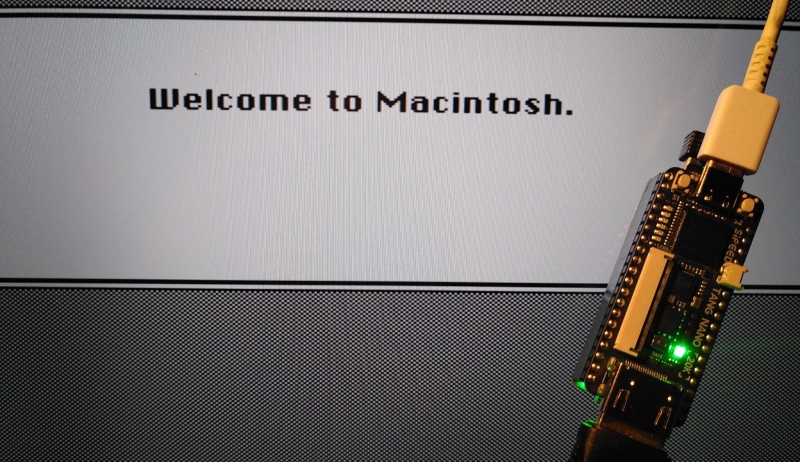Ich sei, gewährt mir die Bitte, in Eurem Bunde der Dritte. Friedrich Schiller
NanoMac is a port of the PlusToo Apple Macintosh Plus FPGA implementation to the Tang Nano 20K FPGA development boards.
This is based on the MiSTeryNano project and also relies on a FPGA companion to be connected to the FPGA board for USB support and on-screen-display control.
This version is based on the MiSTer port of PlusToo which in turn was based on the MiST port of PlusToo. Major changes over these versions have been done to clean-up major parts of the design like video timing, memory access speed, floppy implementation and the like with many more changes to come.
Current state:
- PlusToo core working
- ROM stored in flash ROM
- 128k, 512k, 1M or 4M ram configurable
- Read and write support for two floppy disk images in DSK format
- HDMI video using the original 512x342p@60Hz mode
- Keyboard and Mouse via USB
- Fully simulated
- Two SCSI harddisks
- Serial/WiFi modem support
- MIDI support
- NanoMac #5: Cubase MIDI on the FPGA Macintosh Plus
- NanoMac #4: Over a decade of classic Macintosh gaming
- NanoMac #3: Arkanoid on FPGA Apple Mac Plus
- NanoMac #2: Mac Plus on a tiny FPGA
- NanoMac #1: First boot of Apple Mac Plus on Tang Nano 20k
- The Tang Nano 20k to run the PlusToo core itself
nanomac.fsneeds to be flashed to the FPGA's flash memoryopenFPGALoader -f nanomac.fs
- A mac plus rom (e.g.
plusrom.binfrom the original PlusToo archive) needs to be flashed to offset 0x480000openFPGALoader --external-flash -o 0x480000 plusrom.bin
- A support MCU for USB keyboard and mouse and overall system control
- Attached via breadboard or e.g. through a custom carrier board
- Running the FPGA Companion firmware
- At least one disk image in
DSKformat (819200 bytes in in size) containing e.g. System 3.0 has to be placed on an SD card - Optionally add a SCSI harddisk image like MacPack's boot.vhd
